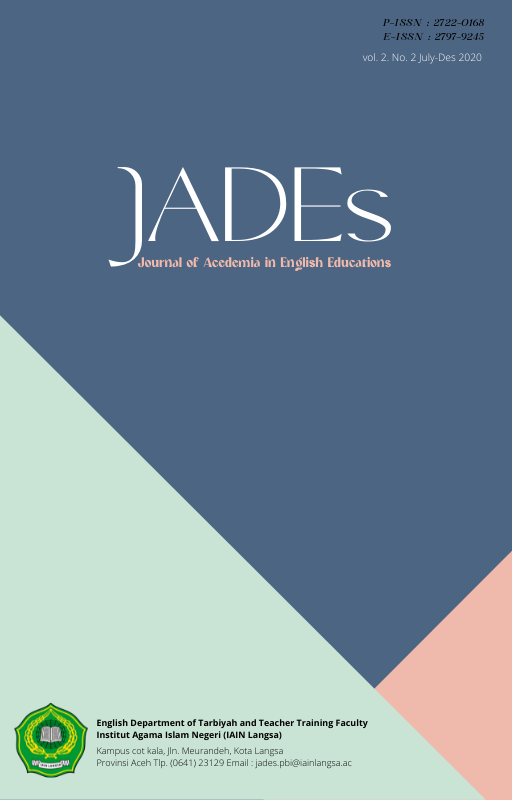Main Article Content
Abstract
This study investigates the impact of Character.ai (C.ai) on speaking self-confidence among Indonesian EFL learners in secondary school setting. Despite English’s global importance, EFL learners often struggle with speaking due to linguistic barriers (e.g., grammar, pronunciation) and psychological barriers (e.g., anxiety, low confidence). Leveraging AI’s potential, this quantitative study employs a pre-experimental one-shot case study design to evaluate Character.ai ‘s effectiveness. Data were collected from 37 eleventh-grade students at SMAN 01 Gunung Putri, Bogor, through post-tests assessing speaking skills (fluency, grammar, vocabulary, pronunciation, comprehension) and self-confidence (ability, assurance, engagement). The results revealed 41% students achieved of “Very Good” category, 43% students achieved of “Good” category, 11% students achieved of “Adequate” category. Statistical analysis (one-sample t -test, t (36) = 2.121, p = 0.041) confirmed a significant improvement in speaking confidence. However, challenges such as classroom noise and low-quality smartphone speakers affected the experience. While C.ai offers real-time feedback and personalized learning without teacher guidance, students’ confidence may also be influenced by other external factors. Thus, the findings highlight both the potential and limitations of using AI-based tools in language learning.
Keywords
Article Details

This work is licensed under a Creative Commons Attribution 4.0 International License.
References
- Benfarhat, O., & Bakhta, L. (2020). The impact of the psychological factors on EFL learners’ oral performance. University of Ibn Khaldoun –Tiaret-.
- Briones, M. S., Lleve, J., Maroto, P. A., Sevillano, J. A., & Villegas, K. (2023). English only please? students’ views of their self-confidence in spoken English in a Philippines state university. Journal of Language and Pragmatics Studies, 2(2), 118–125. https://jurnal.ympn2.or.id/index.php/JLPS
- Curry, M. J., & Lillis, T. (2024). Multilingualism in academic writing for publication?: Putting English in its place. Language Teaching, 57, 87–100. https://doi.org/10.1017/S0261444822000040
- Eliott, L. (2024). Advantages and Disadvantages of AI in the EFL Classroom. The Asian Conference on Education 2023: Official Conference Proceedings, 491–499. https://doi.org/10.22492/issn.2186-5892.2024.43
- Ericsson, E., & Johansson, S. (2023). English speaking practice with conversational AI: Lower secondary students’ educational experiences over time. Computers and Education: Artificial Intelligence, 5, 1–13. https://doi.org/10.1016/j.caeai.2023.100164
- Floridi, L. (2023). On the Brussels-Washington consensus about the legal dfinition of artifivial intelligence. Philosophy & Technology, 36(12), 1–9. https://doi.org/10.1007/s13347-023-00690-z
- Frey, B. B. (2022). The sage encyclopedia of research design. SAGE Publications.
- Getie, A. S. (2020). Factors affecting the attitudes of students towards learning English as a foreign language. Cogent Education, 7(1), 0–37. https://doi.org/10.1080/2331186X.2020.1738184
- Gobena, G. A. (2025). Psychological barriers contributing to students ’ poor English language speaking skills. International Journal of Instruction, 18(1), 273–290. https://doi.org/https://doi.org/10.29333/iji.2025.18115a
- Gulrukh, K., & Dinora, M. (2025). Interdisciplinary Science Teaching. International Conference on Interdisciplinary Science, 02(04), 537–559. https://doi.org/10.4324/9780203824696-22
- Hamuddin, B., Julita, K., Rahman, F., & Derin, T. (2020). Artificial intelligence in EFL context: rising students’ speaking performance with Lyra virtual assistance. In International Journal of Advanced Science and Technology (Vol. 29, Issue 5, pp. 6735–6741).
- Joy, K., Sanjaly, J., & G, N. . (2020). Relation between Self-Esteem and Self-Efficacy in Undergraduate Female College Students. International Journal for Research in Applied Science & Engineering Technology (IJRASET), 8(April), 578–580. https://doi.org/10.22214/ijraset.2020.4094
- Kunnan, A. J. (2024). The concise companion to language assessment. John Wiley & Sons Inc.
- Mahdi, D. A. (2024). Linguistic and non-linguistic barriers to English speaking ability among Saudi EFL learners. Journal of Pedagogical Research, 8(2), 191–211. https://doi.org/10.33902/JPR.202426853
- Odelia, A., Setiyadi, B., & Riyantika, F. (2021). The correlation between students' self-confidence and speaking skill of first year of SMAN 3 Bandar Lampung. Unila Journal of Eanglish Teaching, 10(1), 114–122.
- Rebolledo Font de la Vall, R., & Araya, F. G. (2023). Exploring the Benefits and Challenges of AI-Language Learning Tools. International Journal of Social Sciences and Humanities Invention, 10(01), 7569–7576. https://doi.org/10.18535/ijsshi/v10i01.02
- Seldon, M., & Tshomo, T. (2024). Analysis of the barriers to speaking English: a study of the psychological and social barriers of sherubtse college students, Bhutan. Educational Administration: Theory and Practice, 30(5), 10940–10951. https://doi.org/10.53555/kuey.v30i5.4864
- Supriyanto, A. C., & Savitri, W. E. (2024). Exploring Factors Influencing Speaking Confidence Among Secondary School Students. Journal of English Language Education and Literature, 9(2), 61–74.
- Walsh, P., Owen, P., & Mustafa, N. (2021). The creation of a confidence scale: the confidence in managing challenging situations scale. Journal of Research in Nursing, 26(Juni), 483–496.
- Zhang, C., & Meng, Yiwen and Ma, X. (2024). Artificial intelligence in EFL speaking: Impact on Enjoyment, Anxiety, and willingness to communicate.

